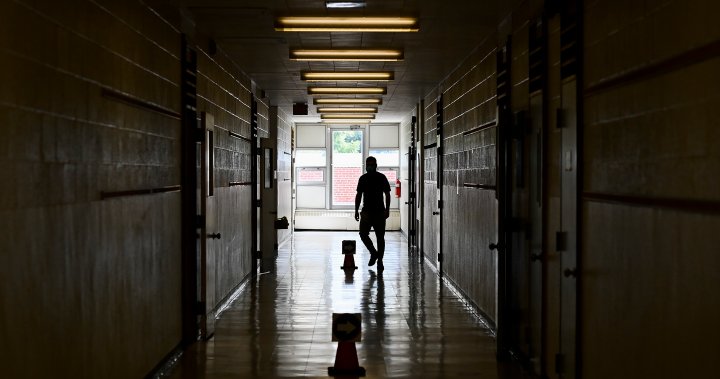It’s only one month into the new school year, and Samantha Becotte says her email inbox is already flooding with reports of student violence on teachers.
Becotte, who is the president of the Saskatchewan Teachers’ Federation, says reports of student-on-teacher abuse have been “very frequent.”
While the union doesn’t record exact incident numbers, a survey from this year found that 35 per cent of teachers in Saskatchewan public schools reported experiencing violence or abuse from students among all grade levels in the last five years.
Becotte says the frequency of reports that she personally received has spiked in the last year.
“It’s a staggering number of incidents,” Becotte told Global News. “Violence in schools towards teachers is definitely a growing trend.”
Saskatchewan’s teachers’ union has received reports of teachers being hit, kicked and spit on. They’ve also heard of concussions, broken bones and unknown substances being dropped into teacher’s drinks, Becotte says.
The union received multiple reports of teachers stabbed with pencils just in the first two weeks of the new school year.
“It is really shocking,” Becotte said.
‘Disgusting and demoralizing’
Saskatchewan isn’t the only region to report this kind of behaviour in public schools.
Multiple provinces and territories told Global News over the past month that they are experiencing an increase in student-on-teacher violence, pointing to a growing system-wide trend across the country.
Teachers’ unions for Ontario, Alberta and Nova Scotia described a similar frequency of incidents as Saskatchewan, as did the Department of Education in Nunavut and the Northwest Territories.
Global News reached out to teachers’ unions and education departments in all provinces and territories, but did not receive responses from others by publication time.
Nunavut’s department has an online reporting system for violence within schools. Of the 245 incidents submitted between October 2022 and June 2023, 107 were student-on-teacher. Seventy of the reports were categorized as abuse/assault, while the rest were discrimination and threats.
Seventy-seven per cent of members in the Elementary Teachers’ Federation of Ontario say they have personally experienced violence or witnessed violence by students against another staff member, according to a survey conducted for the Federation in February and March 2023.
Ryan Lutes, president of the Nova Scotia Teachers Union (NSTU), says the reports he’s been hearing are “disgusting and demoralizing.”
There were 14,000 reports of violence from students in the 2021/22 school year, according to data from the provincial government. In a survey conducted by the NSTU last year, 55 per cent of teachers said they were victims of threats or physical violence while at work.
“Obviously violence is a spectrum … but even low-level acts of violence are a problem. It’s taking a massive toll on our folks,” Lutes told Global News.

Karen Littlewood, president of the Ontario Secondary School Teachers’ Federation, says reports of violence towards teachers have involved both nearly-adult aged students, and kids as young as three years old.
“It’s not just a high school thing. It’s across the board,” Littlewood told Global News. “It’s a lot of incidents and it’s very concerning.”
She says classrooms have become a “scary” place to be. Teachers have to make sure that the safety of a class is protected according to the province’s Occupational Health and Safety Act, and they aren’t able to engage in a work refusal unless they are sure that the rest of the class is safe.
However, Littlewood says it’s becoming more common for teachers to have to take time off.
“I know people who have been off work for 18 months … because of the severity of the injury from a student,” she said.
Several regions across the country have reported a shortage of teachers ahead of the new school year. Quebec’s Education Minister Bernard Drainville confirmed in late August that the province was lacking 1,859 full-time teachers and 6,699 part-time — coming to a total of 8,558 teachers missing.
Littlewood said that as the frequency of these incidents increase, more teachers are leaving their positions altogether.
“We don’t have a teacher shortage. We have a shortage of good working conditions, and that comes back down to the safety in the schools.”
All four unions who spoke with Global News said the true number of incidents is likely higher than reported. Only 23 per cent of teachers participated in Saskatchewan’s latest report, Becotte says.
There were three primary reasons noted for this. Becotte said many teachers don’t want their students to take the blame for the harm they’ve caused.
“They don’t want students, vulnerable students in a lot of cases, to have further disadvantages against them,” she explained.
Becotte said many teachers are also unaware of how to report an incident, or don’t report because they assume it won’t lead to any action.
“I know we hear it all the time that the workload of teachers is just growing and growing. And so to add another task onto their plate sometimes is more work when you know that nothing may come of it,” Becotte said.
Lutes echoes Becotte, saying he has heard many cases of school administrators putting the “onus on teachers to somehow have prevented the violent act.”
Littlewood said the fact that teachers are under-reporting incidents of violence is concerning.
“The only way to have something be done, unfortunately, is to have the data and the reporting and to have the documentation,” she said.

The rise in violence towards teachers didn’t happen overnight. All four unions agreed that two primary factors likely led to this unruly shift in students’ behaviour: the pandemic and funding.
Like Becotte, Lutes said reports have been picking up steam in the past year, which he noted was the first time students were fully back in the classroom since before the pandemic.
“Kids are more complex than they were before (the pandemic), and classrooms are more complex. I think the complexities at our schools … haven’t been matched by increased funding,” Lutes said.
Dr. Shimi Kang, a psychiatrist with Future Ready Minds, said she’s not surprised to hear that incidents of student-on-teacher violence are going up.
“What’s happening inside of schools is happening outside of schools as well. I think the pandemic accelerated and pulled the curtain away from many issues in society. We are seeing an overall general increase in polarization, discrimination (and) bullying,” Kang told Global News.
“This is what we would expect in a really sad, unfortunate way,” she said.
What can be done to make schools safer for teachers? GlobalNews.ca will have continuing coverage on this matter Saturday morning. If you are a teacher who has experienced violence from a student, we want to hear from you. Email [email protected] or share your experience below, and we may contact you.




